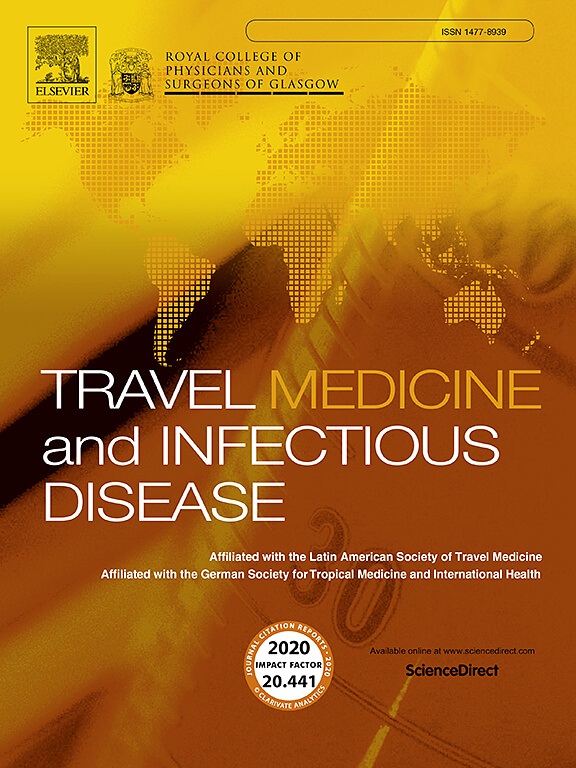Knowledge, attitudes, practices and vaccine acceptance towards seasonal influenza vaccination among international travelers: a cross-sectional survey in Thailand
IF 4.7
3区 医学
Q1 INFECTIOUS DISEASES
引用次数: 0
Abstract
Background
Influenza is a common but preventable disease. International travelers encounter significant risks in contracting influenza.
Methods
The cross-sectional, questionnaire-based study was conducted on international travelers while visiting the Thai Travel Clinic at the Hospital for Tropical Diseases in Bangkok, Thailand.
Results
From May to November 2024, 250 Thai and 229 non-Thai international travelers were enrolled. Most participants reported sufficient knowledge about influenza, with 86.4 % achieving a score of ≥60 % while expressing mild concern of infection [mean perceived risk score of 3.1 ± 2.4 (range from 0 to 10)]. When regarding preventive measures, 72.2 % reported regular hand hygiene, while only 19.4 % regularly wore masks in public. Influenza vaccine acceptance was 38.2 %. The most influential reason for vaccination was healthcare personnel's advice. In the multivariable analysis, the independent factors which affected vaccine acceptance were travelers' nationality, age, purpose of travel, destination country, and perceived risk score.
Conclusion
International travelers had sufficient influenza knowledge but low awareness relating to influenza prevention methods and influenza vaccinations. Low vaccine acceptance rates were observed among international travelers. Travel consultations should focus on influenza awareness while traveling and associated preventative measures.
国际旅行者对季节性流感疫苗接种的知识、态度、做法和疫苗接受程度:泰国的一项横断面调查
流感是一种常见但可预防的疾病。国际旅行者面临感染流感的重大风险。方法对在泰国曼谷热带病医院泰国旅游诊所就诊的国际旅行者进行横断面问卷调查。结果从2024年5月至11月,共纳入250名泰国和229名非泰国国际旅行者。大多数参与者报告对流感有足够的了解,86.4%的人得分≥60%,同时表达了轻微的感染担忧[平均感知风险评分为3.1±2.4(范围从0到10)]。在预防措施方面,72.2%的人报告经常洗手,而只有19.4%的人经常在公共场合戴口罩。流感疫苗接受率为38.2%。接种疫苗最重要的原因是卫生保健人员的建议。在多变量分析中,影响疫苗接受度的独立因素是旅行者的国籍、年龄、旅行目的、目的地国家和感知风险评分。结论国际出境者对流感有充分的了解,但对流感预防方法和流感疫苗接种的了解程度较低。在国际旅行者中观察到低疫苗接受率。旅行咨询应侧重于旅行时的流感意识和相关的预防措施。
本文章由计算机程序翻译,如有差异,请以英文原文为准。
求助全文
约1分钟内获得全文
求助全文
来源期刊

Travel Medicine and Infectious Disease
PUBLIC, ENVIRONMENTAL & OCCUPATIONAL HEALTH-INFECTIOUS DISEASES
CiteScore
19.40
自引率
1.70%
发文量
211
审稿时长
49 days
期刊介绍:
Travel Medicine and Infectious Disease
Publication Scope:
Publishes original papers, reviews, and consensus papers
Primary theme: infectious disease in the context of travel medicine
Focus Areas:
Epidemiology and surveillance of travel-related illness
Prevention and treatment of travel-associated infections
Malaria prevention and treatment
Travellers' diarrhoea
Infections associated with mass gatherings
Migration-related infections
Vaccines and vaccine-preventable disease
Global policy/regulations for disease prevention and control
Practical clinical issues for travel and tropical medicine practitioners
Coverage:
Addresses areas of controversy and debate in travel medicine
Aims to inform guidelines and policy pertinent to travel medicine and the prevention of infectious disease
Publication Features:
Offers a fast peer-review process
Provides early online publication of accepted manuscripts
Aims to publish cutting-edge papers
 求助内容:
求助内容: 应助结果提醒方式:
应助结果提醒方式:


